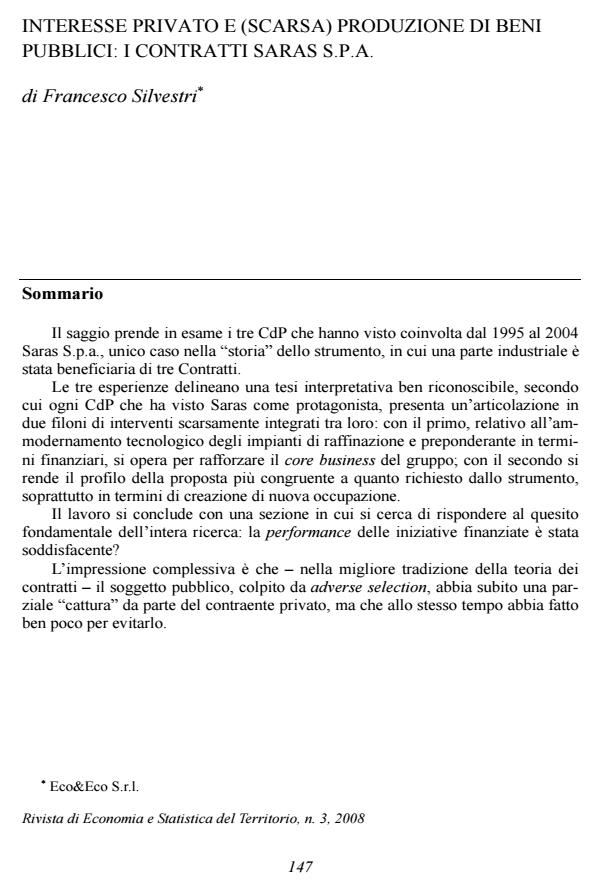Interesse privato e /scarsa produzione di beni pubblici: i Contratti saras S.p.a.
Journal title RIVISTA DI ECONOMIA E STATISTICA DEL TERRITORIO
Author/s Francesco Silvestri
Publishing Year 2009 Issue 2008/3 Language Italian
Pages 17 P. 147-163 File size 173 KB
DOI
DOI is like a bar code for intellectual property: to have more infomation
click here
Below, you can see the article first page
If you want to buy this article in PDF format, you can do it, following the instructions to buy download credits

FrancoAngeli is member of Publishers International Linking Association, Inc (PILA), a not-for-profit association which run the CrossRef service enabling links to and from online scholarly content.
Private Interest and (Inadequate) Production of Public Goods: the Contratto di Programma involving Saras co. - Objectives This work deals with the CdP stipulated by refining oil company Saras between 1995 al 2004, the only case that see the same industrial partner being granted by three consecutive Contracts. The research was aimed to understand some main topics: in which measure and how public incentives affected the company’s choice with respect to size, place and timing of investments; which items affected more final decisions and results, and what kind of long-run effects public supported investments had on local development from a socio-economic perspective. Methods and Results The study has been carried on through documental investigation (Industry Ministry Archive), literature analysis, statistical elaborations, and direct interviews (both vis-à-vis and on the telephone) with managers of Saras and of other involved companies, local unionists, university professors, and experts. Statistical elaborations has been based on official Italian Census and Finance Ministry (Income Department) data, and from Sardinia Economic Observatory data. Finally, with the help of fiscal experts we checked up official balance sheets of Saras co. and of controlled firms. The main result of the analysis is that we can really see a push for local social-economic welfare in last years, but we can hardly accredit it to CdP working. Conclusions In all three contract, industrial plans presented by Saras were composed of a main part aiming at financing capital intensive activities of renewal/revamp/enlargement of plant infrastructures (with 80% of free public funds), and a second independent part (with a lower quota of public financing, but incomparably less costly) addressed to develop research projects of almost no interest for the proponent, to attempt a diversification in new labour intensive activities with few relationships with Saras’ core business, and with a small probability to endure. In practice, Saras was heavily compensated on its core business to sell requested public goods produced in parallel sectors (namely employment), where the firm had no skills at all. In the wellknown tradition of Contract Theory, the public part of the transaction suffered from adverse selection, being captured by the private supplier, but making no effort to avoid this unsatisfactory (on effectiveness basis) result.
Francesco Silvestri, Interesse privato e /scarsa produzione di beni pubblici: i Contratti saras S.p.a. in "RIVISTA DI ECONOMIA E STATISTICA DEL TERRITORIO" 3/2008, pp 147-163, DOI: